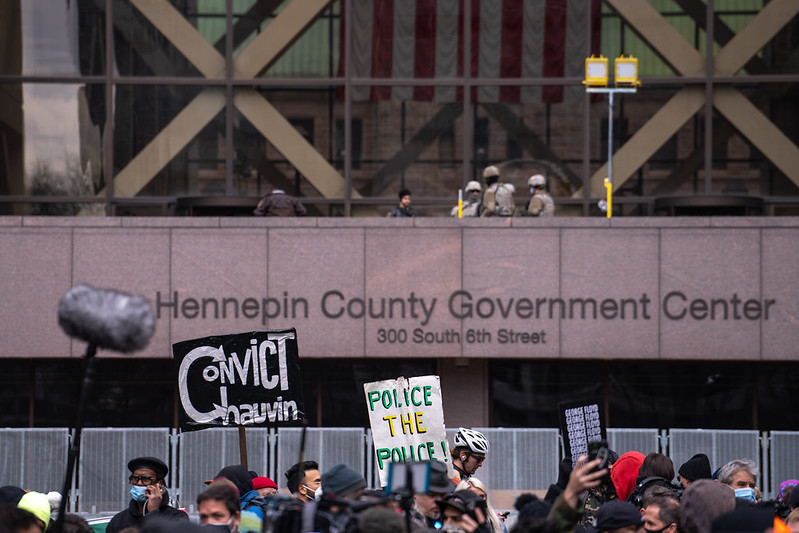Legal Studies Institute helps students understand Derek Chauvin trial
Protestors gather outside the Hennepin County Government Center, where former police officer Derek Chauvin was convicted of killing George Floyd this week. AACC legal studies professors explained the legal aspects of the trial to students during a virtual meeting on Wednesday.
April 29, 2021
Two AACC legal studies professors said Wednesday that students who want to understand the trial of the police officer who killed George Floyd should look at it from a legal perspective, not just an emotional one.
“You can’t really understand the trial of [Derek] Chauvin or the murder of Floyd until you pull back and put the legal perspective in the social perspective and moral perspective,” professor Luke Fredericks told a virtual audience at an event hosted by the Student Government Association and AACC’s Legal Studies Institute.
The event, called “Understanding the Derek Chauvin Trial,” was an opportunity for students to get answers to their questions about the trial of the former Minneapolis police officer, who was found guilty April 20 of Floyd’s murder.
The professors encouraged students to consider all elements related to the trial in order to achieve clarity.
“This is not an easy topic,” Kymberly Jackson, another legal studies professor, said. “It’s a highly emotional topic and obviously it’s gotten a lot of press and a lot of unrest has resulted.”
Fredericks said the easiest way to understand any trial is to think of it in terms of charges.
After Chauvin killed Floyd, the state of Minnesota charged the officer with second-degree—or unintentional—murder; third-degree murder; and second-degree manslaughter.
According to Fredericks, the second-degree murder charge was the easiest for the state to prove.
Second-degree murder involves unintentionally causing someone’s death while committing another felony. In Chauvin’s case, the felony was third-degree assault.
“If I’m looking at a charge like second-degree murder, it is comprised of these four elements,” Fredericks said: “Floyd is deceased, Chauvin caused Floyd’s death while committing third-degree assault [meaning he intentionally applied unlawful force that resulted in bodily harm]; and [it occurred] in Hennepin County.”
According to Fredericks, no one was questioning whether Floyd is dead or where he died, so two of the four elements were not in dispute at the time of the trial.
“Did Chauvin cause Floyd’s death while intentionally inflicting unlawful force? That’s what the state of Minnesota had to answer for the jury,” Fredericks said.
According to Fredericks, if the state failed to prove one of the four second-degree murder elements, the charge would not be viable.
Chauvin is “going to get one sentence on his second-degree murder charge and that’s the only sentence that will matter,” Fredericks said.
Chauvin’s attorneys defended him by saying his actions were legal; that is, they were reasonable and necessary. But after multiple Minneapolis police officers testified that Chauvin’s actions were not reasonable and necessary—and that they would not have done the same thing in the same situation—the jury found Chauvin guilty of all of the charges.
Minnesota’s sentencing recommendation for this kind of conviction when the defendant, like Chauvin, has no criminal record, is 12.5 years. But Fredericks said Hennepin County Judge Peter Cahill might give Chauvin a longer sentence on June 25 if he finds the crime was in the presence of children; was especially cruel; or involved an abuse of authority.
Chauvin is expected to appeal his conviction.
According to Fredericks, Chauvin’s attorneys likely will complain to a higher court that Cahill erred when he allowed the trial to stay in Minneapolis where the murder took place. They also will say the city biased potential jurors and appeared to be admitting Chauvin’s guilt when it gave money to Floyd’s family. And an appeal could involve an argument that the jury, which was not isolated during the trial, should have been sequestered.
“I don’t think any of these issues will be successful, but these are the sorts of things that Chauvin’s attorneys will take to higher court,” Fredericks said.












